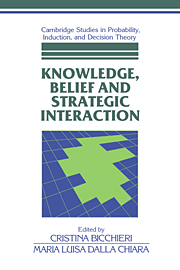Book contents
- Frontmatter
- Contents
- Preface
- List of contributors
- 1 Feasibility
- 2 Elicitation for games
- 3 Equilibrium, common knowledge, and optimal sequential decisions
- 4 Rational choice in the context of ideal games
- 5 Hyperrational games: Concept and resolutions
- 6 Equilibria and the dynamics of rational deliberation
- 7 Tortuous labyrinth: Noncooperative normal-form games between hyperrational players
- 8 On consistency properties of some strongly implementable social choice rules with endogenous agenda formation
- 9 Algorithmic knowledge and game theory
- 10 Possible worlds, counterfactuals, and epistemic operators
- 11 Semantical aspects of quantified modal logic
- 12 Epistemic logic and game theory
- 13 Abstract notions of simultaneous equilibrium and their uses
- 14 Representing facts
- 15 Introduction to metamoral
- 16 The logic of Ulam's games with lies
- 17 The acquisition of common knowledge
- 18 The electronic mail game: Strategic behavior under “almost common knowledge”
- 19 Knowledge-dependent games: Backward induction
- 20 Common knowledge and games with perfect information
- 21 Game solutions and the normal form
- 22 The dynamics of belief systems: Foundations versus coherence theories
- 23 Counterfactuals and a theory of equilibrium in games
17 - The acquisition of common knowledge
Published online by Cambridge University Press: 05 November 2011
- Frontmatter
- Contents
- Preface
- List of contributors
- 1 Feasibility
- 2 Elicitation for games
- 3 Equilibrium, common knowledge, and optimal sequential decisions
- 4 Rational choice in the context of ideal games
- 5 Hyperrational games: Concept and resolutions
- 6 Equilibria and the dynamics of rational deliberation
- 7 Tortuous labyrinth: Noncooperative normal-form games between hyperrational players
- 8 On consistency properties of some strongly implementable social choice rules with endogenous agenda formation
- 9 Algorithmic knowledge and game theory
- 10 Possible worlds, counterfactuals, and epistemic operators
- 11 Semantical aspects of quantified modal logic
- 12 Epistemic logic and game theory
- 13 Abstract notions of simultaneous equilibrium and their uses
- 14 Representing facts
- 15 Introduction to metamoral
- 16 The logic of Ulam's games with lies
- 17 The acquisition of common knowledge
- 18 The electronic mail game: Strategic behavior under “almost common knowledge”
- 19 Knowledge-dependent games: Backward induction
- 20 Common knowledge and games with perfect information
- 21 Game solutions and the normal form
- 22 The dynamics of belief systems: Foundations versus coherence theories
- 23 Counterfactuals and a theory of equilibrium in games
Summary
INTRODUCTION
I shall say that there is mutual knowledge of degree 1 between two people of a fact if they both know it, mutual knowledge of degree 2 if they both know that both know it, and so on, for every finite string of knowings of knowings of this sort. There is common knowledge between them of it if there is mutual knowledge (MK) of every degree between them of it. In the multiperson theories of rational behavior – game theory, economic theory, speech-act theory – states of MK nowadays play a central role. Often, actions are defended as rational by appeal to MK between the agents of something: in philosophy of language, acts of Gricean meaning are so defended; in game theory, persuasive solutions such as “nastiness” (confession at the first round) in the repeated Prisoner's Dilemma. These claims place two obligations on the theories that advance them: first, to provide an etiology – how do knowers get MK? – and second, to cope with a charge of psychological impossibility. The required degree of MK may be high (sometimes even infinitely high); and if it is then the ability to be in the required epistemic state seems to be beyond mere humans.
Three-quarters of this chapter is about the conditions of possibility of mutual knowledge. I consider first the etiological problem, then the problem of human limitations.
- Type
- Chapter
- Information
- Knowledge, Belief, and Strategic Interaction , pp. 285 - 316Publisher: Cambridge University PressPrint publication year: 1992
- 4
- Cited by

